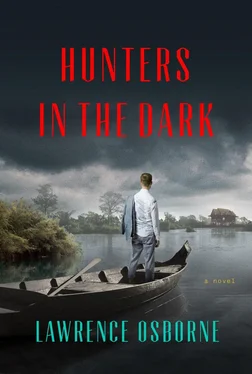She went up to the balcony that looked down onto the garden and a friend of hers found her at eleven, sitting alone and watching the handsome boys in the garden. It was an old school friend, a girl who now worked at the American embassy as a translator, a girl who had suddenly become fatter than herself. The wearisome chatter began.
“I haven’t seen you in a while,” the girl began.
“I’ve been looking for work.”
“We thought you had a boy. Someone saw you with a boy — last night.”
Sophal gave a slight start and then laughed it off. “That was quick!”
“Someone was at China House and saw you with a barang boy.”
“I can’t wriggle out of it.”
“So, who was it?”
The girl snuggled up closer.
I’m not going to play games, Sophal thought grimly.
“An English boy I met. He’s my English tutor.”
A ripple of laughter. “No way!”
“My father hired him.”
“But you had other ideas. That was a fast move.”
“It wasn’t a move. We just hung out.”
“Uh-huh. Is he here?”
“Of course he’s not here.”
“Why of course?”
“I didn’t ask him anyway.”
The girl was sure she would know him. She knew all the eligible barangs.
“What’s his name?”
“Do I really have to tell you, Arunny?”
“Of course you do.”
It was tiresome, but in the end it was better to get it over and done with. Sophal didn’t really care either way.
“His name’s Simon Beauchamp. He’s teaching English for a year, I guess. He used to work in a bank.”
“It sounds familiar.”
“Really? He’s only just got here—”
“Is that what he said?”
“Pretty clearly.”
“I could have sworn — I’ve heard the name before. But it was last year. More than a year ago.”
“Then it couldn’t have been him.”
“Is he blond?”
“He’s got blondish bits.”
“I think I met him.”
Sophal put down her drink and her weariness vanished.
“You met him?”
The girl tittered and rolled her eyes.
“I think I did. Simon — yes, I’m sure I met him.”
“Where?”
“At a party somewhere. On a boat in the river. Some German guy — you know those parties.”
“Who was he with?”
“I think he was with some Khmer girl.”
So that was it.
“But you’re not sure?”
“Well,” the girl snorted, “I couldn’t swear to it, obviously—”
“What could you swear to?”
“Nothing much. It just rings a bell — the name.”
Sophal was angry for a moment.
“I find that hard to believe.”
“There’s nothing to believe, ” the girl retorted. “I’m just telling you what I remember. Lighten up, Sophal. These guys are all the same. They tell you what you want to hear.”
Sophal supposed this was true.
“So you mean he’s been here longer than he said?”
“Well, yeah.”
“It’s a possibility, isn’t it?”
Her voice was sad for a moment and the girl flinched.
“It’s no big deal,” she offered. “I just met him at a river party. I mean, I didn’t do anything with him!”
“I didn’t say you did. It’s just annoying.”
“Men are annoying, didn’t you know?”
“I don’t find them that annoying. It’s myself I find annoying.”
“Why don’t you invite him now and I’ll tell you if it’s him?”
Sophal threw up her hands.
“God, I hate things like this. I don’t care if he was here last year. He had his reasons to lie.”
“I dare say,” the girl said sarcastically.
“I knew it. I had a feeling—”
“One always does.”
“It’s true.” Sophal paused. “Shall I invite him?”
“No. Let’s get drunk. Invite him later.”
—
But for the rest of the evening Sophal let it prey upon her mind. The one thing that had never occurred to her was that Simon had lied about the length of his sojourn in her city. That lie seemed more fantastical than others he might have told and deep down she didn’t quite believe it. Naïvéte is hard to simulate. And if Simon was one thing, it was naive. She had never seen naïvéte like it.
It was like snow with only a tinge of dirt.
The following day she called him and when he didn’t pick up she sent him a text message. She invited him to meet her at a venerable French restaurant called Van inside the old Banque d’Inchochine building. She said it was her treat and to wear a nice shirt. He accepted. She stayed in all day studying, then told her father that she was going to Van for an English lesson. “With Simon,” he said with a smile. She went back upstairs and dressed in an Agnès B dress she had bought in Paris and which fitted her perfectly and a pair of steely pearl earrings. It was a different look, a rich girl’s look, and she knew how to do it. It was a look that had a bit of thunder and lightning to it. She had never been glamorous or even pretty in her own estimation but she knew how to carry the color black. She put on a thin layer of lipstick.
That night a few protests erupted around the city. She heard the staccato pop of sporadic gunfire, the far-off din of violence. On her way to the restaurant she passed the remains of shattered barricades littered with shoes, bloody T-shirts and tear-gas cartridges. Police stood at the corners in their plastic face visors, weapons tilted on hips. The acrid taste of the gas had not yet dissipated. Yet a few blocks away it was as if nothing was happening. Van, in any case, was one of the older and pricier French places which ambassadors, sundry diplomats and businessmen liked to frequent when they wanted to sink into no-nonsense old-school French food. Tournedos Rossini, as at Le Royal, with wedges of foie gras and perch quenelles and timbales de crevettes downed with bargain-price bottles of Duhart-Milon. The restaurant was wainscoted and the floors creaked when the shy, silent Khmer waiters dared to cross them. It was almost always half empty but its small outdoor terrace overlooked the wide square by the colonial post office.
She got there first and was shown to the outdoor table which she had specified. She ate there with her parents and they knew her well. The square was alive with motodops and streaming crowds. From the table by the wall she could even look down at the nocturnal girls sitting on stools outside the wild bars on Street 102. It was an alien energy which threw the quiet European terrace into relief, but it often happened that it still unsettled the diners’ subtle feeling of superiority, especially if they were visiting Europeans. Not Sophal. She sat there now and ordered a Kir Royale. They made them thick and sweet here and she liked them that way. She could smoke outside and she liked the slight swish of the mosquitoes around her bare shoulders. She had, in fact, been coming there since she was little, and the waiters were subtly indulgent to her. One of them lit her cigarette for her. Then she saw Robert walking across the square with his shoulders slightly hunched, in the same linen trousers he always wore. The shirt he always wore. Men did love their lazy uniforms. He even saw her on the terrace and they waved and she saw for a moment the dirty-snow naïvéte in his face. She was becoming surer that her friend had made a banal mistake. They always took too many drugs at parties with foreigners.
Robert came into the monochrome-tiled downstairs lobby with the old heavy-set green doors of the bank. There was a shrine there and a kitsch statue fountain of a European angel. Inside, Khmer statuary, a droplet chandelier and steep polished wooden stairs which led up to a claustrophobic landing where the glass windows of a fridge displayed to passing diners prime cuts of Australian beef. The chandelier-lit main room was robed with sashed cotton curtains and there was an ancient phonograph on a pedestal, but no guests except a table of elderly French tourists. A waiter escorted him to the terrace. There was no one there either but Sophal and he was for a moment taken aback by the almost brutal elegance of the black dress and the earrings and the color of the mouth that was smiling back at him.
Читать дальше












